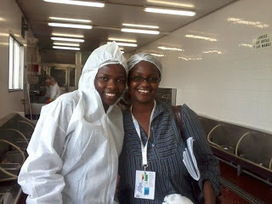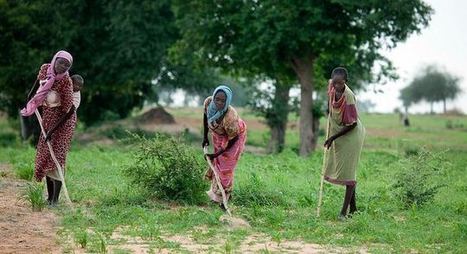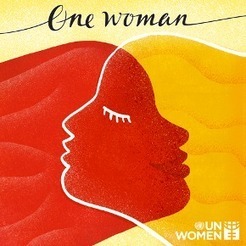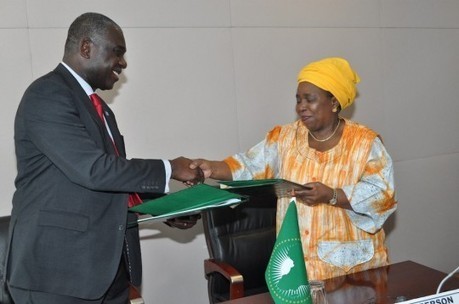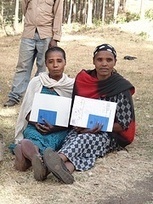 Your new post is loading...
 Your new post is loading...

|
Scooped by
Robin Landis
July 19, 2013 10:48 AM
|
AWARD is a career-development program that equips top women agricultural scientists across sub-Saharan Africa to accelerate agricultural gains by strengthening their research and leadership skills through tailored fellowships. AWARD is a catalyst for innovations with high potential to contribute to the prosperity and well-being of African smallholder farmers, most of whom are women. AWARD Fellows benefit from two-year fellowships focused on fostering mentoring partnerships, building science skills, and developing leadership capacity. Fellows stay in their institutions, continue their research, and travel to AWARD training courses held in various locations in Africa. Eligibility Women agricultural scientists who are citizens of Ethiopia, Ghana, Kenya, Liberia, Malawi, Mozambique, Nigeria, Rwanda, Tanzania, Uganda, or Zambia, who have completed a bachelor’s, master’s or doctoral degree, particularly in the disciplines listed below, are eligible to apply. There is no age restriction.

|
Scooped by
Robin Landis
July 5, 2013 6:40 AM
|
Urban food security and gender are critical factors needing full integration in the National Urban Policy (NUP) if it is to address the needs of the poorest residents of Uganda’s cities.
Without attention to the inequalities of power and the subsequent gradations of poverty within communities, Uganda’s NUP will be ineffective in reaching marginalized groups within the poor.
A focus on economic opportunities, better administration and slum upgrades will not meet the larger challenges of urban food security, which differ substantially from food insecurity in rural areas.

|
Scooped by
Robin Landis
July 5, 2013 6:33 AM
|
"It is no longer a development programme, and we have come up with various programmes to improve production like using ICT tools to help farmers reach markets...
...the US$ 40 billion spent on food imports by Africa should be channeled towards supporting the growth of small-scale farmers, especially women...
"The issue is not lack of resources but lack of intelligence to plan properly. We need to empower small-scale farmers especially women that have been feeding Africa for centuries...If African women are not empowered, the continent will not develop fully."

|
Scooped by
Robin Landis
July 3, 2013 2:56 AM
|
On July 2, First Ladies from nations across Africa joined First Lady Michelle Obama, President George W. Bush, Laura Bush and distinguished leaders in Dar es Salaam, Tanzania, for a two-day summit, entitled "Investing in Women: Strengthening Africa." The event will focus on strategies for advancing opportunities for African women. Research confirms that when women have access to the right tools, training and opportunities, they act as catalysts for broader economic and social advancement. As the African proverb so wisely states, "When women move forward, the world moves with them." However, we know that development issues are complex and require cross-sector collaboration to address them. Unlocking the extraordinary potential of women in low-income countries will require ambitious collaborations between governments, businesses, universities and non-profit organizations. Consider the challenges faced by women farmers in the developing world. According to the United Nations' Food and Agriculture Organization, many of these women lack access to the financing, land, education and technology available to men. The UN reports that eliminating this one gender disparity would increase food production by as much as four percent in developing countries, and pull upwards of 150 million people out of hunger1. Such gains would be particularly beneficial for many African nations, where explosive population growth poses one threat to the continent's food supply2. Developing countries also prosper when women are empowered to take charge of their finances and become involved in their economies. The World Bank published a series of major studies highlighting gender equality as a critical foundation for development investment. Their reports note that investments in women and girls strengthen countries' ability to grow their GDP and reduce poverty.

|
Scooped by
Robin Landis
July 3, 2013 2:43 AM
|
President Ellen Johnson Sirleaf chaired the Opening Ceremony of the 2nd High-Level Meeting of the GlobalPOWER Women Network Africa (GPWNA), in Abuja, on Thursday, June 27, and said that the national targets set under Goals 2 and 4 of the High-Level Panel on the Post-2015 Development Agenda, are clearly "in sync" with the objectives of the GlobalPOWER Women Network Africa... ...[GlobalPOWER], an African Union and UNAIDS-supported initiative, is a network of African women who are elected and appointed representatives that are at decision-making tables. The network seeks to advance gender equality and women's empowerment and promotes discussion of accelerated action for women empowerment and gender equality in the area of HIV and Sexual and Reproductive Health and Rights in Africa, focusing on the vulnerability of girls and young women.

|
Scooped by
Robin Landis
July 3, 2013 2:34 AM
|
African leaders pledged on Monday to reprioritise agriculture in their national policies and increase state spending to end hunger across the continent by 2025...[they] also pledged to give women access to more land and credit – 70% of Africa's agriculture workforce is female – and make the sector more attractive to young people by increasing the use of technology. The final declaration did not set out any concrete targets or cash commitments, and it will therefore fall to delegates at next year's agriculture-focused AU summit to put flesh on the bones.

|
Scooped by
Robin Landis
June 25, 2013 4:28 AM
|
In this video, taken at the US Agency for International Development’s May 2013 Gender GLEE event, Julie Borlaug, grandaughter of Norman Bourlag and Associate Director for External Relations at the Norman Borlaug Institute for International Agriculture, discusses the importance of gender in the U.S. Government’s Feed the Future Initiative. Project example from RWANDA.

|
Scooped by
Robin Landis
June 24, 2013 9:30 AM
|
A recent UN Women paper examines gender equality in 49 African constitutions. Most contain statements relating to equality and non-discrimination, with many including specific reference to property rights. Despite this, female land ownership across the continent is as low as 20% It makes economic sense to provide security of tenure for women. Women usually perform the role of food producer and household manager, making sure all household members are fed. Giving women – particularly female-headed households – greater influence over land assets allows them greater control over household incomes, and welfare. Tenure security also enhances women’s power in agricultural production and in social relationships in the wider community.

|
Scooped by
Robin Landis
June 24, 2013 2:52 AM
|
The founder of Victoria Seeds, Uganda's leading seed company, which caters to smallholder farmers and exports to South Sudan, Rwanda, Tanzania and the Democratic Republic of the Congo, is no shrinking violet. The day before visiting the Guardian, Okot spoke on a panel at the Overseas Development Institute (ODI) to discuss two reports on linking smallholders to markets in Africa. Despite having flown in only that morning, Okot was a lively and forceful presence on the panel, befitting an entrepreneur who has won awards including a Africa Award for Entrepreneurship in 2011. Okot founded her company in 2004, at a time when commercial banks considered agricultural investments to be too risky. She only succeeded in securing start-up capital because of a guarantee from a USAid project. Victoria Seeds has grown into a business with a $2.5m turnover, employing 140 people. More than 900 farmers, mostly women, grow seeds for the company. It markets more than 95 varieties of cereal, legume, vegetable, oil, horticultural and forage crops. The company disseminates seeds across Uganda through more than 400 agro-dealer outlets. In her interview in the Guardian's hushed atmosphere and during her appearance at the ODI, Okot bemoaned Africa's farmers' lack of productivity and their reliance on rudimentary tools. "The hand-held hoe should no longer be a tool of production, it is an embarrassment that it still is," she says. Okot laments the lack of agricultural extension services – the provision of training and advice to smallholders. The absence of advice and good seeds account for crop yields in Uganda that reach only a third of their potential, she says.

|
Scooped by
Robin Landis
June 19, 2013 6:50 AM
|
SLIDE SHOW Tens of thousands in Somalia have died from famine, with countless others cut down in relentless combat. Now Somalis face yet another widespread terror: an alarming increase in rapes and sexual abuse of women and girls.

|
Scooped by
Robin Landis
June 18, 2013 10:13 AM
|
Recognising the importance of gender mainstreaming within institution’s budgets is vital because it creates a baseline for analysis and implementation of Gender Budget Statements and its impact on both women and men... ...What we discovered was that the budgets actually had great programmes but they were not specific on which ones benefited women...the will to empower women is there but the challenge is the absence of skills required to formulate and merge their action plans and activities into a Budget Statement.
...Consequently, the GMO District Assessment Report, 2012/13 GBS tasks the Local Government with the responsibilities to address gender-related gaps in all sectors.

|
Scooped by
Robin Landis
June 14, 2013 9:04 AM
|
Reducing gender inequity will require a wide range of policies. This column describes a framework for quantifying the growth effects of gender policies in developing economies and, by applying an overlapping generations model to Brazil, shows that gender policy is likely to produce tangible economic results, but only in the long term. [The] approach calibrates the steady-state solution of the model – based on rigorous microfoundations and which possesses well-defined long-run properties – and focuses on the long-run effects of gender-based policies. Many of these policies are structural in nature and are likely to produce tangible economic results but only over a period of several years. While the model described here may not provide complete versatility, it does represent a significant analytical step forward in an area where there is a dearth of quantitative tools available for policy analysis.

|
Rescooped by
Robin Landis
from Fabulous Feminism
June 14, 2013 8:45 AM
|
The effective and meaningful participation of women in policymaking, programming and implementation is crucial to increasing success in all phases of disaster risk management. This participation, combined with timely and adequate attention to the gender aspects of disasters and climate change, can in turn lead to greater gender equality and strengthen the resilience of entire communities.
Via bobbygw
|

|
Scooped by
Robin Landis
July 5, 2013 6:44 AM
|
OXFAM GB "Women's Collective Action: Unlocking the potential of agricultural markets" is a new report, and the key outcome of a three-year research project into Women's Collective Action (WCA).

|
Scooped by
Robin Landis
July 5, 2013 6:38 AM
|
[Tanzanian] President Jakaya Kikwete opened the African First Ladies Summit in Dar es Salaam on Tuesday commenting on how women in Africa do most of the work but often get much less for their sweat and toil than what lands in the hands of men.
The issue he was shedding light on was as serious at the summit as it has always been – and this is that women do most of the labour but their work is not adequately appreciated.
Women constitute the majority of the 80 per cent of the farming population in Tanzania, most of whom live in underserved rural areas. In that agriculture is the backbone of the economy, it is only fair to say they deserve a pat on the back for easily standing as the drivers of the country’s economy.
Unfortunately, despite global meetings echoing the importance of empowering women, most deliberations usually end on paper and little is done to improve women’s lives. While being the major producers, most women engaged in agriculture are smallholders making do with the hoe.
All this is despite our having put in place institutions that are supposed to provide loans to farmers as a way of improving their lives...

|
Scooped by
Robin Landis
July 3, 2013 5:08 AM
|
Late last year, IRIN launched the series Our Lives, which interviewed 20 men and women in 10 countries about how they coped with the cost of living. Those testimonies have been updated, along with basic monthly income and expenditure data, providing a fascinating insight into people’s domestic affairs.
Eighteen of our respondents said their household incomes had improved or stayed the same since December 2012... ...In Kenya, Milicent Wanyama’s profits rose after she was able to add the sale of doughnuts to her breadcrumb business in the Ngomongo slums of Nairobi (some residents cannot afford an entire loaf)...

|
Scooped by
Robin Landis
July 3, 2013 2:49 AM
|
In October 2009, UNHCR announced a strategy for bringing to proper closure the situation of Rwandan refugees who fled their country before 31 December 1998. The strategy contains four components: voluntary repatriation, local integration, retention of refugee status for people still in need of international protection, and finally the invocation of the so-called cessation clause... ...UNHCR is working very closely with all the Governments and other stakeholders concerned, including, the refugees themselves, on the implementation of the different aspects of the strategy beyond 30 June 2013... ...More than 3.5 million Rwandans became refugees in the wake of the 1994 genocide and armed clashes in northwestern Rwanda in 1997 and 1998 - the last time the country experienced generalized violence. All but an estimated 100,000 have since returned home, owing to lasting peace and stability in their country... ...The 100,000 Rwandan refugees are hosted mainly by Burundi, the Democratic Republic of the Congo, Kenya, Malawi, Mozambique, the Republic of the Congo, South Africa, Uganda, Zambia, and Zimbabwe.

|
Scooped by
Robin Landis
July 3, 2013 2:37 AM
|
There are some 600,000 Somali refugees in Kenya, according to government figures, more than two thirds of whom live in the sprawling, 20-year-old Dadaab complex in the east of the country... ...The current situation on the ground in Somalia definitely does not allow for a mass repatriation of refugees. Certainly, there are areas in Somalia that are becoming safer and secure, but the stability is fragile... ...UNHCR's position - as elsewhere around the world - is that refugees should make informed decisions about whether to return home and should return home voluntarily in safety and dignity... So far this year, 17,000 Somali refugees living in Kenya returned to Somalia, according to UNHCR, which pointed out that some of them may have done so only temporarily, for example to plant crops.

|
Scooped by
Robin Landis
June 28, 2013 3:37 AM
|
The Annual Report documents UN Women’s work to foster women’s empowerment and gender equality around the world. It highlights some of the organization’s initiatives during the year and provides summary financial statements, a list of new programmes and projects, and contact information.

|
Scooped by
Robin Landis
June 24, 2013 9:37 AM
|
The African Union Commission (AUC), in close collaboration with United Nations Development Programme (UNDP) launched a regional Building an Enabling Environment for Women’s Economic Empowerment and Political Participation in Africa programme. The programme aims to ensure that: --By 2016 the African Union and RECs have an enhanced capacity to support gender responsive agricultural investment; --By 2016, women and youth entrepreneurs access to financing and business development services; --By 2016 women have an increased representation in elected political /leadership positions as well as in public boards, tribunals and commissions at the regional level; --By 2016, there is an enhanced integration of gender equality in institutional planning, budgeting and monitoring processes at regional level (AU, RECs).

|
Scooped by
Robin Landis
June 24, 2013 2:59 AM
|
Former US President George W. Bush and his wife Laura Bush are expected to host a summit on the crucial role of African first ladies in promoting women’s empowerment to be held in Dar es Salaam on July 2 and 3 this year.
In a statement issued in Dar es Salaam yesterday the US Embassy said African First Ladies from across the continent will gather at the George Bush Institute’s “Investing in Women: Strengthening Africa.”
The summit will focus on the important role First Ladies play in promoting women’s education, health and economic empowerment.

|
Scooped by
Robin Landis
June 24, 2013 2:47 AM
|
BLOG ...Young African women are at the receiving end of harmful traditional practices such as child marriage, female genital mutilation and girl-pledging which take away their autonomy and imperil their health. These practices put them at high risk of contracting sexually transmitted diseases, including HIV, and are partly why the complications of pregnancy and childbirth are the leading cause of death of women aged 15-19 in Africa. Practices such as child marriage leave girls vulnerable to violence, too, with child brides more at risk of domestic and sexual abuse than their unmarried peers... ...I believe it is our role as young Africans to pressure our leaders to turn these discussions into concrete action plans that secure the health of African mothers. In my view, the most important aspect needing intervention is child marriage, which is key to reducing maternal mortality and violence against girls and women... ...Day of the African Child offers the opportunity for African leaders to state their commitment to address child marriage and other practices that have harmful consequences for children across Africa. A great place to start would be for African leaders to commit to enacting and enforcing laws on a minimum age of marriage.

|
Scooped by
Robin Landis
June 18, 2013 10:17 AM
|
Gender-responsive budgeting (GRB) is government planning, programming and budgeting that contributes to the advancement of gender equality and the fulfillment of women's rights. Find links to UN Women's work in Ethiopia, Rwanda and Uganda.
Every year, approximately 200 million people around the world are affected by disasters. Of these, 100 million are women or girls, according to the UN’s Office for Disaster Risk Reduction (UNISDR).
Yet while the UN General Assembly endorsed in 2005 the Hyogo Framework of Action (HFA) - a 10-year plan to make the world safer from natural hazards, which calls for gender perspectives to be integrated into disaster programmes - most countries currently still lack such gender-sensitive policies.
The latest reports on the HFA’s progress showed that, in the period from 2009 to 2011, 62 out of 70 countries consulted did not collect gender-disaggregated information on disaster vulnerability and capacity.

|
Scooped by
Robin Landis
June 14, 2013 9:01 AM
|
Gender norms in Ethiopia vary widely depending on geographic location, ethnicity, and religion, especially related to property ownership, inheritance, and the division of assets after divorce. However, one norm transcends most regions: disputes are usually settled by community arbitrators—older men in the family or community—which has meant, until recently, that most cases are settled in favor of the man... ...A new Family Code has changed all that. Passed in 2000, it gives equal rights to women in marriage and it requires all assets be divided equally among both partners in the case of a divorce. By now, all the states in Ethiopia have approved this new Code.
|



 Your new post is loading...
Your new post is loading...

